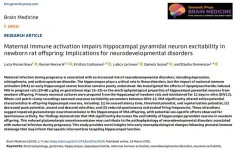(Press-News.org) BRATISLAVA, Slovakia, 18 March 2025 – A pioneering peer-reviewed research study published in Brain Medicine provides compelling evidence that maternal infections during pregnancy can have lasting effects on offspring brain function. Researchers from the Slovak Academy of Sciences investigated the impact of maternal immune activation (MIA) on hippocampal pyramidal neurons in newborn rat offspring and found that prenatal inflammation significantly impairs neuronal excitability. These changes in brain function may underlie the increased risk of neurodevelopmental disorders associated with maternal infections.
“Maternal infections are a known risk factor for conditions like autism, schizophrenia, and depression,” said Dr. Eliyahu Dremencov, corresponding author of the study. “Our research shows that early-life alterations in hippocampal neuron function could be a key mechanism linking prenatal inflammation to these disorders.”
How Maternal Inflammation Impacts Brain Development
During pregnancy, infections trigger an immune response that releases cytokines—chemical messengers that can cross the placenta and impact fetal brain development. Using a well-established animal model, the researchers induced MIA in pregnant rats with lipopolysaccharide (LPS), a bacterial component that stimulates the immune system. They then examined the hippocampal neurons of newborn offspring to assess how prenatal immune activation affected their excitability.
“We observed that neurons from MIA-exposed offspring had a significantly higher threshold for activation, slower response times, and reduced firing rates,” explained Dr. Lucia Moravcikova, lead author of the study. “This suggests a disruption in glutamatergic neurotransmission, which plays a critical role in learning, memory, and emotional regulation.”
Key Findings: Altered Neuronal Excitability and Reduced Firing Rates
The study’s electrophysiological analysis revealed several major changes in hippocampal neuron function in newborns exposed to MIA:
Increased threshold potential – Neurons required a stronger stimulus to activate, suggesting impaired excitability.
Delayed action potential latency – Neurons took longer to respond to stimulation, affecting signal transmission.
Reduced peak potential and firing rates – Both spontaneous and evoked activity were significantly decreased, indicating lower neurotransmitter release.
Sex-specific effects – Male offspring showed a greater reduction in spontaneous neuronal activity, which may have implications for the higher prevalence of certain neurodevelopmental disorders in males.
“One of the most striking aspects of our findings is the sex-specific vulnerability to prenatal inflammation,” noted Dr. Moravcikova. “This could help explain why conditions like autism and schizophrenia are more commonly diagnosed in males.”
Implications for Autism, Schizophrenia, and Depression
The hippocampus is a crucial brain region involved in memory, emotion, and cognition, and its dysfunction has been implicated in multiple neurodevelopmental disorders. The study’s results support the hypothesis that prenatal immune challenges can disrupt early brain wiring, leading to long-term cognitive and behavioral impairments.
“Our findings align with human epidemiological studies linking maternal infection to an increased risk of psychiatric disorders,” said Dr. Dremencov. “Understanding how prenatal inflammation alters brain function could open the door to new preventative or therapeutic approaches.”
Potential Therapeutic Interventions
With growing evidence that prenatal inflammation affects brain function, researchers are now exploring strategies to mitigate these effects. Potential interventions include:
Anti-inflammatory treatments during pregnancy – Carefully administered medications that reduce excessive immune responses.
Neuroprotective therapies – Targeting disrupted neurotransmitter pathways to restore normal brain function.
Early-life interventions – Techniques like transcranial magnetic stimulation (TMS) to enhance neuronal excitability and connectivity.
“If we can identify ways to prevent or reverse these changes in early development, we may be able to reduce the long-term burden of neurodevelopmental disorders,” said Dr. Dremencov.
Key Questions Moving Forward
Can prenatal anti-inflammatory treatments reduce the risk of neurodevelopmental disorders?
How do these findings translate to human brain development?
Are there specific time windows during pregnancy when interventions would be most effective?
The peer-reviewed Research Article “Maternal immune activation impairs hippocampal pyramidal neuron excitability in newborn rat offspring: Implications for neurodevelopmental disorders” appears online on 18 March 2025 in Brain Medicine (Genomic Press) and is freely accessible at https://doi.org/10.61373/bm025a.0029.
About Brain Medicine: Brain Medicine (ISSN: 2997-2639) is a high-quality medical research journal published by Genomic Press, New York. Brain Medicine is a new home for the cross-disciplinary pathway from innovation in fundamental neuroscience to translational initiatives in brain medicine. The journal’s scope includes the underlying science, causes, outcomes, treatments, and societal impact of brain disorders across all clinical disciplines and their interface.
END
Zürich/Lausanne, Switzerland – 18 March 2025 – inait today announced a collaboration with Microsoft to accelerate the development and commercialization of inait’s innovative AI technology, using its unique digital brain AI platform. The collaboration will focus on joint product development, go-to-market strategies, and co-selling initiatives, initially targeting the finance and robotics sectors.
inait's AI technology, born from decades of neuroscience research offers a paradigm shift in artificial intelligence. Its “brain programming language” and ability to learn from experience and understand cause and effect delivers cognitive ...
LAUSANNE, March 18, 2025 – The Open Brain Institute (OBI) launches today as a groundbreaking non-profit organization, transforming neuroscience from the physical to the virtual world. Building on the pioneering achievements of the EPFL’s Blue Brain Project, OBI opens the era of simulation neuroscience—empowering researchers to build and simulate digital brains with unprecedented detail, scale, and speed.
AI has been given access to the software recipe to build digital brains, providing natural language support to researchers to explore, build and ...
Helicobacter pylori bacteria is considered to be the main cause of gastric cancer, with the infection rate particularly high in the Asia-Pacific region. Approximately 90% of cases are linked to H. pylori bacterial infections, but preemptive eradication can reduce the incidence of gastric cancer by 30-40%.
However, the increase in antimicrobial drug-resistant bacteria used in eradication therapy is a major issue. In addition, while secondary prevention through endoscopic examinations is also important for the early detection of gastric cancer, it is not clear to what extent Asia-Pacific practitioners recognize its importance.
An international ...
UNDER EMBARGO UNTIL 00:01 AM UK TIME ON TUESDAY 18 MARCH 2025
Almost one in ten people (9.1%) in England think they could have Long Covid but aren’t sure, according to a new analysis of NHS England survey data by the University of Southampton.
Researchers also found that 4.8% of people reported having Long Covid, with higher rates among people living in deprived areas, people with particular ethnic backgrounds, parents or carers, and those with another long-term condition.
The findings are published today [18 March] ...
Researchers at Heriot-Watt University have made a ground-breaking discovery paving the way for a transformative era in photonic technology.
For decades, scientists have theorised the possibility of manipulating the optical properties of light by adding a new dimension—time. This once-elusive concept has now become a reality thanks to nanophotonics experts from the School of Engineering and Physical Sciences in Edinburgh, Scotland.
The team’s breakthrough emerged from experiments with nanomaterials known as transparent conducting oxides (TCOs) - a special ...
(MEMPHIS, Tenn. – March 17, 2025) As the H5N1 avian influenza outbreak continues, scientists are working to better understand the virus’s threat to human health. The virus has been found in dairy cows’ milk and has infected farm workers, prompting scientists at St. Jude Children’s Research Hospital to study potential treatments. Results showed that in a preclinical model, two FDA–approved flu antivirals generally did not successfully treat severe H5N1 infections. Additionally, the researchers found that the route of infection, whether through ...
Thomas Jefferson University has initiated a phase 1 clinical trial for a Lassa virus (LASV) vaccine developed at Jefferson in collaboration with the University of Maryland, Baltimore (UMB), at the Center of Vaccine Development and Global Health, UMB. Currently, there are no approved vaccines against the Lassa virus. The clinical study is a dose-ranging study that will assess the safety and immunogenicity of the candidate vaccine for both the rabies virus and LASV.
The experimental vaccine is based on an attenuated and killed rabies virus vaccine similar to current rabies vaccines and has an additional ...
Outpatient primary care clinics at Hebrew SeniorLife’s Orchard Cove and NewBridge on the Charles communities have been recognized by the Institute for Healthcare Improvement (IHI) as Age-Friendly Health Systems — Committed to Care Excellence.
“I want to express my gratitude to the team at Hebrew SeniorLife for your dedication to age-friendly care,” said Leslie Pelton, MPA, Vice President, Institute for Healthcare Improvement (IHI). “Age-Friendly Health Systems and IHI celebrate your recognition as an Age-Friendly ...
For decades, atomic clocks have been the pinnacle of precision timekeeping, enabling GPS navigation, cutting-edge physics research, and tests of fundamental theories. But researchers at JILA, led by JILA and NIST Fellow and University of Colorado Boulder physics professor Jun Ye, in collaboration with the Technical University of Vienna, are pushing beyond atomic transitions to something potentially even more stable: a nuclear clock. This clock could revolutionize timekeeping by using a uniquely low-energy transition within the nucleus of a thorium-229 atom. This transition is less sensitive to environmental disturbances than modern atomic clocks and has been proposed for tests of fundamental ...
FOR IMMEDIATE RELEASE
Monday, March 17, 2025
Contact:
Jillian McKoy, jpmckoy@bu.edu
Michael Saunders, msaunder@bu.edu
##
As health complications and deaths from alcohol use disorder (AUD) increase in the United States, it is critical that people who could benefit from medications have access to the drugs that the US Food and Drug Administration has approved to treat AUD. Yet, for individuals who have alcohol use disorder and are covered by Medicaid, accessing these medications is difficult; past research indicates that only about 1 in 20 Medicaid enrollees with alcohol use disorder receive these ...






